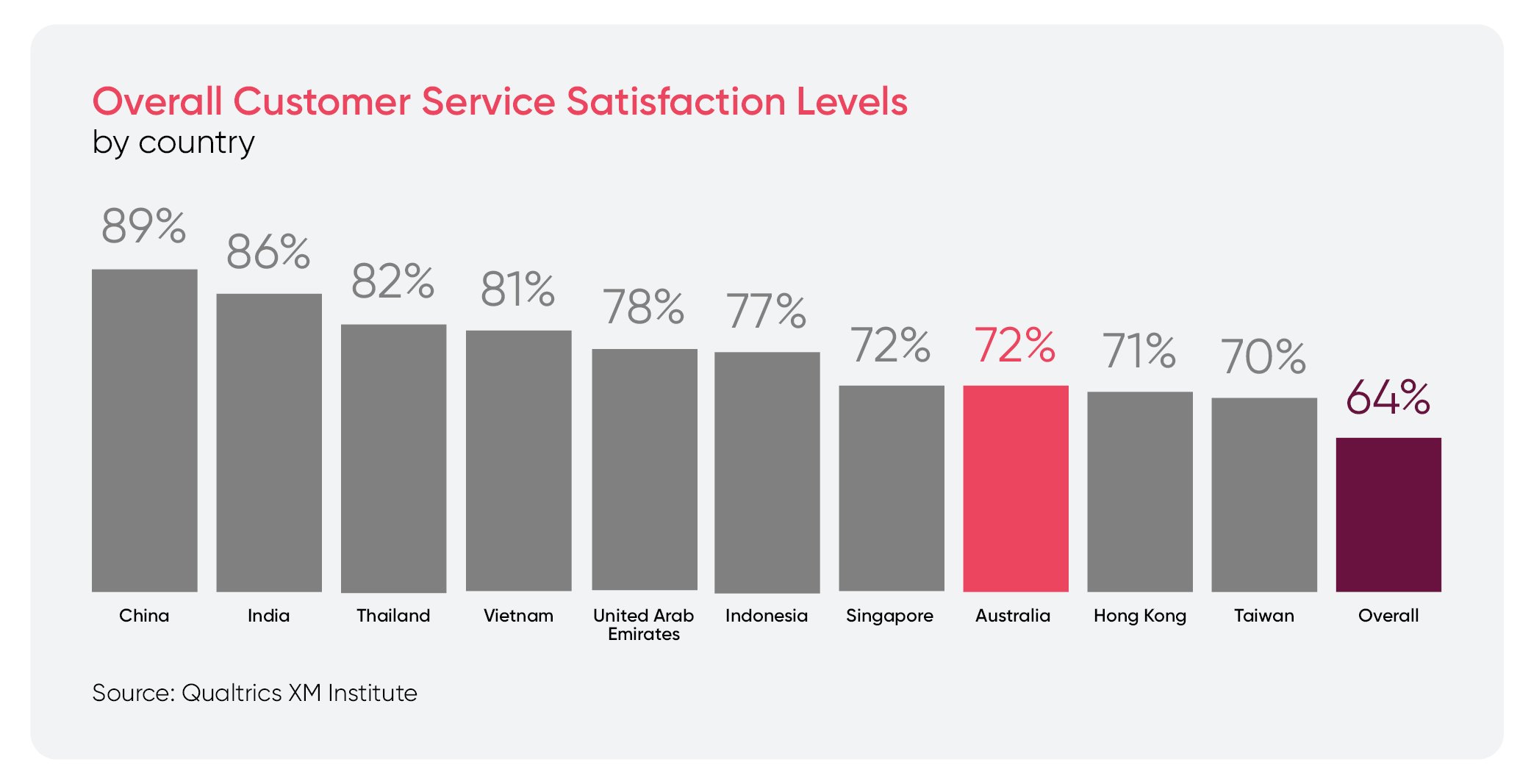Australia: a leader in excellent customer support
In a recent global study analysing consumer sentiment around contact centre support, Australia has consistently ranked in the top 10 — but is there more we could be doing?
This piece explores the unique qualities of Australian customer care and leverages the local knowledge and international reach of TSA Group’s CX specialists, and looks at ways the sector in Australia can continue to improve.
Customer care is more vital than ever in today’s uncertain world, so it’s reassuring to know Australia was recently ranked in the upper echelon of a worldwide study analysing consumer sentiment around contact centre support.

Australia ranked 8th in customer service satisfaction
Findings from the Qualtrix XM Institute’s Global Study: State of the Contact Centre Experience – which surveyed consumers from 29 countries – revealed Australia ranked eighth in customer service satisfaction levels.
When it came to customers’ waiting times during their most recent contact centre dealings, Australia was ranked in the top six.
The survey also revealed Australian and New Zealand consumers who had their issue fully resolved were satisfied with their recent customer service experience at a rate 5.9 times higher than those whose problems were left unresolved.
The results were of no surprise to Blaine Slater, TSA Group’s Chief Growth Officer, who says Australia’s excellent track record in customer support stems from a welcoming and engaging culture, thanks to a unique multicultural mix.
With a network of CX centres in Western Australia, South Australia, Victoria, Queensland, and the Philippines, Mr Slater says TSA Group’s contact centre teams have an advantage when it comes to helping customers.
“In Australia, you can provide very little context and people immediately understand what your issue is and what you’re experiencing,” he explains.
“It helps that most people at TSA can really engage on that basis, because they don’t need a lot of information to be able to solve customers’ problems.”
New technology driving CX excellence
The importance of technology in contact centre operations is also a core component driving good customer service, Mr Slater explains.
Technology, according to Mr Slater, is a valuable tool to analyse call volumes and intent, which benefits the overall customer experience.
“Technology is a core part of all the processes that drive good customer service,” Mr Slater says.
“Analytics is quite a common and well-established gauge for Australian businesses to measure customer experience.
“And that in itself drives a focus on customer experience from executives down and ensures that the customer experience is good.”
Mr Slater says technology is also crucial in the recruitment process, which assists Australian operators such as TSA Group in finding good call centre candidates and upskilling teams.
“We use technology to assess candidates, whereas before it was done by a human,” Mr Slater says.
“What the technology allows us to do is effectively recruit from anywhere, rather than people initially coming in for an interview, and it removes a lot of bias from the process.
“And as you go through the training, the ability to navigate systems and written communications skills can be augmented and supported by technology.
“There is technology now available where the customer might say ‘I need help with my bill’ and the technology can recognise that intent from the customer and deliver knowledge articles or instructions to the agent.
“All of those types of things are helping simplify an agent’s or a frontline team member’s experience, and it is integrated within the delivery model.”
Smartshoring to optimise costs
In other top-ranking countries such as China, Vietnam, Thailand and India, their higher spot in the top ten list may well be due to the level of support that can be afforded, Mr Slater says.
“In Australia, the cost is more than if you were to engage in a contact centre offshore and with that reduced cost offshore, you can also add extra support,” he explains.
“There are smaller ratios in terms of management to frontline team members, that means there’s more opportunity presented to those places to actually develop and work with staff members.”
However, Australia-based call centre operations still have certain advantages, Mr Blaine says, particularly if they adopt a ‘smartshoring’ approach.
Smartshoring is a strategic approach of combining onshore and offshore resources to optimise efficiency, cost effectiveness and customer service quality in call centres.
For TSA Group, that approach involves dividing workloads between two locations – Australia and the Philippines – based on specific criteria, with high value and complex tasks handled by the onshore team, and routine and less complex tasks offshored to the Philippines.
“This provides the cost advantages of outsourcing while maintaining service standards and enhancing the customer experience,” Mr Slater says.
“The onshore team in Australia handles the more intricate customer enquiries that require advanced product knowledge, cultural familiarity or complex issue resolution.
“These tasks benefit from the local workforce’s language proficiency, cultural understanding and proximity to the customer base, and results in higher customer satisfaction levels.
“By offshoring routine tasks such as basic troubleshooting, general enquiries and administrative support, operators can benefit from lower labour costs available in other countries.
“This hybrid approach achieves a balance between cost optimisation and quality service delivery, ultimately improving operational performance and enhancing customer interactions.”
TSA are Australia’s market leading specialists in CX Consultancy and Contact Centre Services. We are passionate about revolutionising the way brands connect with Australians. How? By combining our local expertise with the most sophisticated customer experience technology on earth, and delivering with an expert team of customer service consultants who know exactly how to help brands care for their customers.